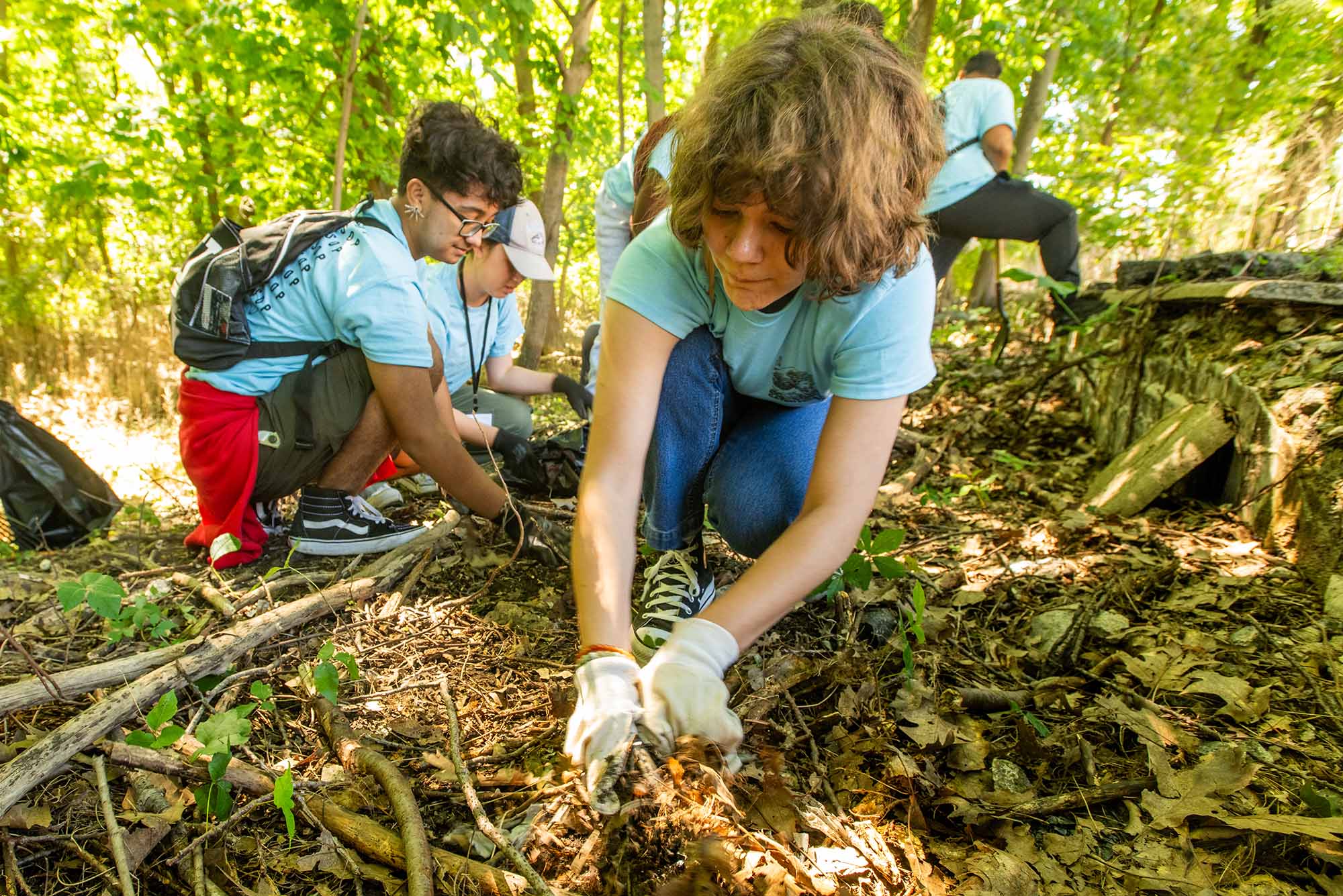FYSOP Looks to Expand the Horizons of Incoming First-Years
Over three days, students will prepare the Mather and Condon Schools for the upcoming school year and get a feel for campus life

During last year’s FYSOP program, Daniel Calvo (CAS’27) (left) and Sofie Truck (CAS’27) cleaned up trash, brush, weeds, and more from the Neponset River Reservation and Ryan Park in Boston.
FYSOP Looks to Expand the Horizons of Incoming First-Years
Over three days, students will prepare Boston’s Mather and Condon Schools for the upcoming school year and get a feel for campus life
While their classmates are doing last-minute back-to-school shopping and packing up to head to campus, approximately 400 freshmen and new transfer students will arrive on campus August 28 to participate in the University’s First-Year Student Outreach Project (FYSOP). Now in its 35th year, the three-day program sends students on service-based activities across Boston and is centered around the pillars of service, education, and reflection. It is organized by BU’s Community Service Center (CSC) and is staffed by 80 volunteers, many of them previous participants.
The program kicks off Wednesday, August 28, with Foundation Day, which is centered around educating students on the impact of their service and why they are helping specific people or organizations. The opening ceremony includes the presentation of this year’s theme, Expand Your Horizons, which focuses on taking advantage of the opportunities offered at BU and beyond, says Jonny Cohn (CAS’25), one of FYSOP’s three program managers. “It’s about the breadth of opportunity that you have in college in general,” he says, “but then also taking a step back and realizing where we are at BU, and the privilege we have as being really in the thick of a real city grid.”
It’s about the breadth of opportunity that you have in college in general, but then also taking a step back and realizing where we are at BU, and the privilege we have as being really in the thick of a real city grid.
Orpheo Speer, director of the CSC, says the theme aims to support students who are about to enter a competitive environment. “When folks are entering the city, there’s so much to offer,” he says. “We’re encouraging people to broaden that scope; [don’t] just be totally insular in that classroom experience, but also understand that college is not just an academic learning experience, it’s also a social one.”
Mariam Bekele (Sargent’26), another FYSOP program manager, adds that the theme is focused on fostering open-mindedness in participants. She hopes that the first-years will better understand why they signed up for FYSOP while they interact with the local community. The organizers also made an effort to mix students by college and major to help widen their social networks, Bekele says, since the program aims to provide a community to transitioning students.
After a kickoff ceremony, students will participate in team-building activities, as well as what program manager Zeezee Igwe (Pardee’26) refers to as “education reflection,” where they learn why they are doing a specific service.
Speer says such activities help students “put their best foot forward” by learning about the social justice topics relevant to the service they will be doing for a community. “We don’t want to go out into a community and do service because we think that community needs it,” Speer says. “We want to have it be informed by the community.”
We don’t want to go out into a community and do service because we think that community needs it. We want to have it be informed by the community.
The second day of FYSOP, Thursday, August 29, is Service Day. This year, participants and counselors will travel to the James F. Condon School in South Boston and the Mather Elementary School in Dorchester to help prepare them for the upcoming school year. Service activities include cleaning classrooms, pruning the schoolyard, and painting murals. Students will also clean a nearby church food pantry.
FYSOP’s program managers say they chose the two schools for two reasons: there are plentiful service opportunities for everyone and the schools demonstrate need in FYSOP’s focus areas of youth and family advocacy, food justice, and sustainability.
Focus areas are an important part of FYSOP because they help students break down large, complex issues into issues they understand, Cohn says, so they can more easily find opportunities to help out. “Hopefully they understand how intertwined all the focus areas are, and then realize the different ways to get involved,” he says. “These issues on a local level begin to take shape in a way of like, ‘Oh this is how I can actually make an impact myself.’”
In addition to time for personal reflection and education on day three—Friday, August 30—students can check out a showcase featuring BU student service groups. Speer describes this event as a “mini-Splash” (referring to BU’s twice-yearly involvement fair).
The final piece of Friday’s activities will feature presentations from BU Student Wellbeing, the LGBTQIA+ Student Resource Center, Big Brothers Big Sisters, and other organizations.
Students choose which presentations to attend based on their interests. Cohn hopes students push themselves to attend talks dealing with topics they are unfamiliar with.
“We’re sort of laying the groundwork so that the kids can feel like they’re free for these three days and they’re really engaging in things that they find interesting,” he says.
Friday culminates with a closing ceremony featuring several speakers, including Melissa L. Gilliam, BU’s new president, Jason Campbell-Foster, dean of students, and former FYSOP participants.
Comments & Discussion
Boston University moderates comments to facilitate an informed, substantive, civil conversation. Abusive, profane, self-promotional, misleading, incoherent or off-topic comments will be rejected. Moderators are staffed during regular business hours (EST) and can only accept comments written in English. Statistics or facts must include a citation or a link to the citation.